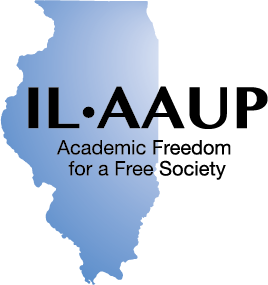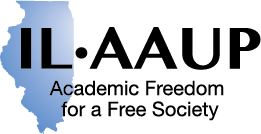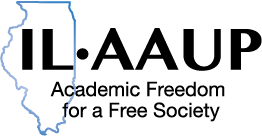Illinois AAUP standing committees work on a variety of topics of importance to higher education and to faculty. Special committees are occasionally appointed to address a specific issue. The president of the Association serves as an ex officio member of all committees.
A description of each standing committee follows. Members are appointed to committees by the president of the Association. Members of the Illinois AAUP staff are assigned to assist the committees in their work. The Constitution provides that the president shall be ex officio a member of all committees except the Nominating Committee, the Election Committee, and the Election Appeals Committee.
Academic Freedom and Tenure (Committee A)
Promotes principles of academic freedom, tenure, and due process in higher education through the development of policy documents and reports relating to these subjects and the application of those principles to particular situations that are brought to its attention. The staff is authorized to receive, on behalf of the committee, complaints of departures from these standards and, where appropriate, to undertake formal investigations. Such investigations may lead to a recommendation from the committee to the Association’s national council and annual meeting that the administration of an institution be censured for failure to adhere to the principles of academic freedom and tenure as endorsed by the AAUP and hundreds of other professional and educational organizations.
Academic Professionals
Deals with issues involving college and university professionals who work in positions other than faculty appointments. Such issues include recruitment and appointment, compensation, job security, and protection of professional autonomy and responsibility. The committee also promotes the inclusion of academic professionals in the Illinois AAUP.
College and University Governance
Promotes meaningful faculty participation in institutional governance through the development of policy statements and reports related to shared governance and application of those principles to particular situations that are brought to its attention. The staff is authorized to receive, on behalf of the committee, complaints of departures from these standards and, where appropriate, to undertake formal investigations. Such cases may lead to a recommendation from the committee to the Association’s national council that an institution be sanctioned for “substantial noncompliance with standards of academic governance.”
Community Colleges
Deals with issues of concern to faculty in the nation’s community colleges. Advances Illinois AAUP principles on community college campuses in such matters as faculty workload, shared governance, academic freedom, and the over-reliance on contingent academic labor.
Contingency and the Profession
Deals with issues related to contingent faculty appointments. Works to improve conditions for contingent faculty members and to reverse the trend towards part-time and non-tenure-track appointments.
Gender and Sexuality in the Academic Profession
In June 2019 the AAUP Council, acting on the recommendation of members of the affected committees, voted to merge the Committee on Women in the Academic Profession and the Committee on Sexual Diversity and Gender Identity into the new Committee on Gender and Sexuality in the Academic Profession. The committee will formulate policy statements, provide resources, and report on matters of interest to all those who identify as women, femme, and nonbinary, and to the academic community, addressing such issues as equity in pay, work/family balance, sexual harassment and discrimination, Title IX, and the role of gender and sexuality in rank and tenure.
One Faculty
Stay tuned for more information on the One Faculty Committee.
Professional Ethics
Promotes the observance of professional and ethical standards by members of the higher education community through the development of policy statements and reports and the application of those principles to particular ethical situations.
Teaching, Research, and Publication
Addresses issues of concern to all faculty, such as faculty workload, teaching evaluation, assessment, and curricular issues, through the development of policy documents and reports and the application of those principles to particular situations.


